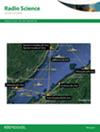Ultra-wide band antipodal vivaldi antenna using metasurface lens for gain and front-to-back ratio (FBR) improvement
IF 1.6
4区 地球科学
Q3 ASTRONOMY & ASTROPHYSICS
引用次数: 0
Abstract
This paper addresses the limited gain of conventional Antipodal Vivaldi Antenna (AVA) at higher frequencies. We propose a novel Metamaterial Lens Vivaldi Antenna (MLVA) design that overcomes this limitation by integrating an exponentially tapered antenna lens and a strategically placed Near Zero Refractive Index (NRZI) metamaterial lattice. The MLVA achieves exceptional wideband performance with a — 3 dB gain bandwidth exceeding 148.6% from 3.7 to 25 GHz. The result demonstrates a peak realized gain of 11.8 dBi at 11.2 GHz, compared to 9.1 dBi conventional AVA, especially beyond 5 GHz. The compact MLVA design measures only 120 × 78 × 1.524 mm 3 (1.48 × 0.96 × 0.0188λ使用元面透镜提高增益和前后比 (FBR) 的超宽带反波段维瓦尔第天线
本文探讨了传统反转维瓦尔第天线(AVA)在较高频率下增益有限的问题。我们提出了一种新颖的超材料透镜维瓦尔第天线(MLVA)设计,通过集成指数锥形天线透镜和战略性放置的近零折射率(NRZI)超材料晶格,克服了这一限制。MLVA 实现了卓越的宽带性能,在 3.7 至 25 GHz 范围内的 - 3 dB 增益带宽超过 148.6%。与 9.1 dBi 的传统 AVA 相比,该产品在 11.2 GHz 的峰值增益达到了 11.8 dBi,尤其是在 5 GHz 以上。紧凑型 MLVA 设计的尺寸仅为 120 × 78 × 1.524 mm3 (1.48 × 0.96 × 0.0188λ03) λ0 (其中自由空间波长为最低频率),采用 RO4350 B 衬底制造,带有 50-Ω SMA 连接器。设计的主要特点包括指数翼形和梯形透镜几何结构,选择这两种透镜是因为它们具有有效准直和引导球形波面的固有能力。介质透镜和元表面的加入,通过将大部分能量导向末端发射方向,进一步提高了增益和前后比(FBR)。实验结果验证了拟议设计的有效性,证实了模拟预测。这些出色的特性使 MLVA 有望成为要求在宽频率范围内实现高数据传输率的各种无线通信和雷达应用的候选器件。
本文章由计算机程序翻译,如有差异,请以英文原文为准。
求助全文
约1分钟内获得全文
求助全文
来源期刊

Radio Science
工程技术-地球化学与地球物理
CiteScore
3.30
自引率
12.50%
发文量
112
审稿时长
1 months
期刊介绍:
Radio Science (RDS) publishes original scientific contributions on radio-frequency electromagnetic-propagation and its applications. Contributions covering measurement, modelling, prediction and forecasting techniques pertinent to fields and waves - including antennas, signals and systems, the terrestrial and space environment and radio propagation problems in radio astronomy - are welcome. Contributions may address propagation through, interaction with, and remote sensing of structures, geophysical media, plasmas, and materials, as well as the application of radio frequency electromagnetic techniques to remote sensing of the Earth and other bodies in the solar system.
 求助内容:
求助内容: 应助结果提醒方式:
应助结果提醒方式:


